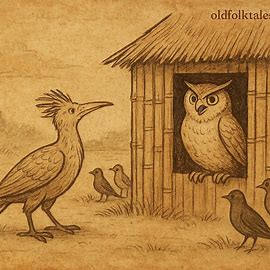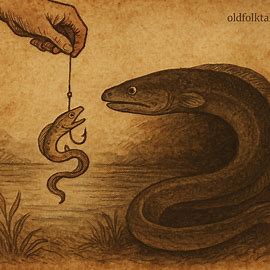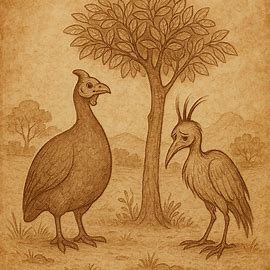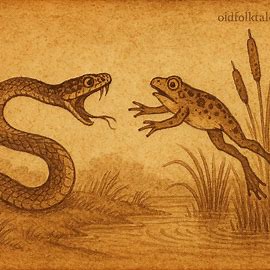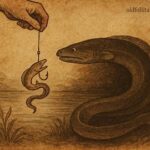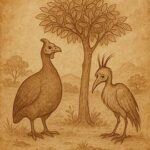The takatra and the owl once swore themselves as blood brothers. At first, their bond seemed strong, but what began as trust would soon unravel into betrayal, trickery, and a curse that echoes through time.
One day, the owl invited the takatra to visit him:
“Come and spend a few days in my home, brother.”
The takatra accepted, eager to honor their friendship. Yet when he arrived, disappointment filled him. The owl’s house was in ruins, overgrown with weeds, its walls broken, no furniture within, and the whole place neglected.
“Is this your house?” the takatra asked. “Come see mine. It is much better kept.”
The owl agreed. When he entered the takatra’s home, he marveled:
“Bravo, brother! Your house is splendid. Truly, it is well built and beautiful.”
So the owl stayed, and for a while they lived together in peace. But soon hunger came. The takatra said:
“Brother, let us search for food. I am weak with hunger.”
The owl replied lazily:
“Let us wait for shade. The sun burns too hot.”
Another day, when the takatra asked again, the owl protested:
“It is already too warm indoors. I will stay here.”
Frustrated, the takatra shouted:
“God forbid! You are no brother of mine,” and kicked the owl before running outside. He then begged other birds to drive the owl out of his house, but none dared face him.
READ THIS: Why Snakes Eat Frogs: A Madagascan Folktale That Teaches Lessons on Pride and Revenge
First came the mighty papangue. The takatra pleaded:
“O lord papangue, the owl has stolen my home. Drive him out, and I will reward you with three necklaces and four mother grasshoppers.”
The papangue boasted:
“Do not fear, I will tear him apart.”
But when he called at the doorway, the owl thundered:
“It is I, who have a drum in my chest and a beard below my throat. If I look up, the sky collapses; if I cough, the earth trembles; if I strike the water, it scatters. Whoever comes, I shall devour!”
Terrified, the papangue fled. “He is too powerful. I cannot face him.”
Then the heron came, and the takatra offered the same reward. At first confident, the heron too fled when he heard the owl’s terrible boasts. “Friend takatra, I cannot fight him. May God protect you, for we are kin, but I dare not face what I heard.”
One by one, other birds came and left in fear.
The takatra grew thin and weak, pecking miserably at scraps like a chicken. Then the small tsintsina bird passed by and asked:
“O lord takatra, why are you so sad and thin, lips cracked, bending in sorrow? What has happened?”
The takatra told his story:
“I am ruined. The owl, my sworn brother, has taken my house. His was worthless, but mine is strong and warm. Now he threatens to kill me. Help me, lord tsintsina! Drive him out, and I will reward you with three necklaces and four mother grasshoppers.”
The tsintsina answered:
“Do not despair. The crocodile and the serpent will join us, and together we will decide his fate.”
When they arrived, the crocodile advised:
“If he tries to fly, cut his wings.”
So the tsintsina stood at the door and cried:
“Who is in the house of the takatra?”
The owl roared:
“It is I, who have a drum in my chest, a beard beneath my throat; if I look up, the sky falls; if I cough, the earth trembles; if I kick the water, it vanishes. Whoever comes, I shall devour!”
Furious, the tsintsina leapt inside. He clung to the owl’s wings, then darted straight into his mouth and out the other end. The owl collapsed dead.
The tsintsina turned to the takatra:
“Now give me the three necklaces and four mother grasshoppers. Your brother is dead, bury him.”
“Thank you, lord tsintsina,” said the takatra. “But I will not bury a traitor. Wait here, I will bring your reward.”
He soon returned with a bundle wrapped in taro leaves. Inside were the four grasshoppers, but instead of necklaces, three frogs.
“Where are the necklaces?” demanded the tsintsina.
“These are the necklaces,” replied the takatra. “Eat them.”
“Never!” cried the tsintsina. “Frogs are sacred to us. You have tricked me. My descendants will never help you again. And I curse you: may you never have descendants yourself!”
And so, they say, the takatra and the tsintsina are no longer friends, and they never peck the ground together.
Moral Lesson
This Malagasy folktale teaches that betrayal and deceit destroy even the strongest bonds. The takatra broke his blood-oath with the owl, and then cheated the tsintsina, who had risked everything to help him. In the end, trust was lost, curses were laid, and friendships shattered. The tale warns us that loyalty and honesty must guide relationships; for those who deceive will find themselves abandoned and cursed by their own actions.
Knowledge Check
Who were the main blood brothers in the story?
The takatra and the owl.
Why did the owl move into the takatra’s house?
Because his own house was ruined and unfit to live in.
What boast did the owl make that scared away other birds?
That he could make the sky collapse, the earth tremble, and water vanish.
Which small bird finally killed the owl?
The tsintsina (Cisticola madagascariensis).
How did the takatra betray the tsintsina?
By promising necklaces but delivering frogs instead.
What is the key lesson of the tale?
That betrayal and broken promises destroy trust and bring lasting consequences.
Source: Betsileo folktale, Madagascar.
